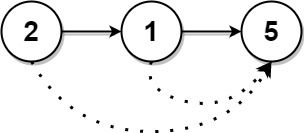Welcome to Subscribe On Youtube
1019. Next Greater Node In Linked List
Description
You are given the head of a linked list with n nodes.
For each node in the list, find the value of the next greater node. That is, for each node, find the value of the first node that is next to it and has a strictly larger value than it.
Return an integer array answer where answer[i] is the value of the next greater node of the ith node (1-indexed). If the ith node does not have a next greater node, set answer[i] = 0.
Example 1:

Input: head = [2,1,5] Output: [5,5,0]
Example 2:

Input: head = [2,7,4,3,5] Output: [7,0,5,5,0]
Constraints:
- The number of nodes in the list is
n. 1 <= n <= 1041 <= Node.val <= 109
Solutions
-
/** * Definition for singly-linked list. * public class ListNode { * int val; * ListNode next; * ListNode() {} * ListNode(int val) { this.val = val; } * ListNode(int val, ListNode next) { this.val = val; this.next = next; } * } */ class Solution { public int[] nextLargerNodes(ListNode head) { List<Integer> nums = new ArrayList<>(); for (; head != null; head = head.next) { nums.add(head.val); } Deque<Integer> stk = new ArrayDeque<>(); int n = nums.size(); int[] ans = new int[n]; for (int i = n - 1; i >= 0; --i) { while (!stk.isEmpty() && stk.peek() <= nums.get(i)) { stk.pop(); } if (!stk.isEmpty()) { ans[i] = stk.peek(); } stk.push(nums.get(i)); } return ans; } } -
/** * Definition for singly-linked list. * struct ListNode { * int val; * ListNode *next; * ListNode() : val(0), next(nullptr) {} * ListNode(int x) : val(x), next(nullptr) {} * ListNode(int x, ListNode *next) : val(x), next(next) {} * }; */ class Solution { public: vector<int> nextLargerNodes(ListNode* head) { vector<int> nums; for (; head; head = head->next) { nums.push_back(head->val); } stack<int> stk; int n = nums.size(); vector<int> ans(n); for (int i = n - 1; ~i; --i) { while (!stk.empty() && stk.top() <= nums[i]) { stk.pop(); } if (!stk.empty()) { ans[i] = stk.top(); } stk.push(nums[i]); } return ans; } }; -
# Definition for singly-linked list. # class ListNode: # def __init__(self, val=0, next=None): # self.val = val # self.next = next class Solution: def nextLargerNodes(self, head: Optional[ListNode]) -> List[int]: nums = [] while head: nums.append(head.val) head = head.next stk = [] n = len(nums) ans = [0] * n for i in range(n - 1, -1, -1): while stk and stk[-1] <= nums[i]: stk.pop() if stk: ans[i] = stk[-1] stk.append(nums[i]) return ans -
/** * Definition for singly-linked list. * type ListNode struct { * Val int * Next *ListNode * } */ func nextLargerNodes(head *ListNode) []int { nums := []int{} for ; head != nil; head = head.Next { nums = append(nums, head.Val) } stk := []int{} n := len(nums) ans := make([]int, n) for i := n - 1; i >= 0; i-- { for len(stk) > 0 && stk[len(stk)-1] <= nums[i] { stk = stk[:len(stk)-1] } if len(stk) > 0 { ans[i] = stk[len(stk)-1] } stk = append(stk, nums[i]) } return ans } -
/** * Definition for singly-linked list. * class ListNode { * val: number * next: ListNode | null * constructor(val?: number, next?: ListNode | null) { * this.val = (val===undefined ? 0 : val) * this.next = (next===undefined ? null : next) * } * } */ function nextLargerNodes(head: ListNode | null): number[] { const nums: number[] = []; while (head) { nums.push(head.val); head = head.next; } const stk: number[] = []; const n = nums.length; const ans: number[] = new Array(n).fill(0); for (let i = n - 1; ~i; --i) { while (stk.length && stk[stk.length - 1] <= nums[i]) { stk.pop(); } ans[i] = stk.length ? stk[stk.length - 1] : 0; stk.push(nums[i]); } return ans; } -
/** * Definition for singly-linked list. * function ListNode(val, next) { * this.val = (val===undefined ? 0 : val) * this.next = (next===undefined ? null : next) * } */ /** * @param {ListNode} head * @return {number[]} */ var nextLargerNodes = function (head) { const nums = []; while (head) { nums.push(head.val); head = head.next; } const stk = []; const n = nums.length; const ans = new Array(n).fill(0); for (let i = n - 1; i >= 0; --i) { while (stk.length && stk[stk.length - 1] <= nums[i]) { stk.pop(); } ans[i] = stk.length ? stk[stk.length - 1] : 0; stk.push(nums[i]); } return ans; }; -
// Definition for singly-linked list. // #[derive(PartialEq, Eq, Clone, Debug)] // pub struct ListNode { // pub val: i32, // pub next: Option<Box<ListNode>> // } // // impl ListNode { // #[inline] // fn new(val: i32) -> Self { // ListNode { // next: None, // val // } // } // } struct Item { index: usize, val: i32, } impl Solution { pub fn next_larger_nodes(head: Option<Box<ListNode>>) -> Vec<i32> { let mut res = Vec::new(); let mut stack: Vec<Item> = Vec::new(); let mut cur = &head; for i in 0..usize::MAX { if cur.is_none() { break; } res.push(0); let node = cur.as_ref().unwrap(); while !stack.is_empty() && stack.last().unwrap().val < node.val { res[stack.pop().unwrap().index] = node.val; } stack.push(Item { index: i, val: node.val, }); cur = &node.next; } res } }